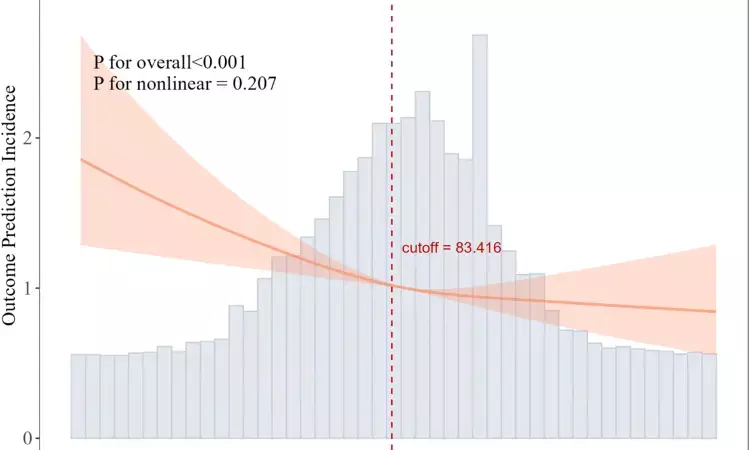- Home
- Medical news & Guidelines
- Anesthesiology
- Cardiology and CTVS
- Critical Care
- Dentistry
- Dermatology
- Diabetes and Endocrinology
- ENT
- Gastroenterology
- Medicine
- Nephrology
- Neurology
- Obstretics-Gynaecology
- Oncology
- Ophthalmology
- Orthopaedics
- Pediatrics-Neonatology
- Psychiatry
- Pulmonology
- Radiology
- Surgery
- Urology
- Laboratory Medicine
- Diet
- Nursing
- Paramedical
- Physiotherapy
- Health news
- Fact Check
- Bone Health Fact Check
- Brain Health Fact Check
- Cancer Related Fact Check
- Child Care Fact Check
- Dental and oral health fact check
- Diabetes and metabolic health fact check
- Diet and Nutrition Fact Check
- Eye and ENT Care Fact Check
- Fitness fact check
- Gut health fact check
- Heart health fact check
- Kidney health fact check
- Medical education fact check
- Men's health fact check
- Respiratory fact check
- Skin and hair care fact check
- Vaccine and Immunization fact check
- Women's health fact check
- AYUSH
- State News
- Andaman and Nicobar Islands
- Andhra Pradesh
- Arunachal Pradesh
- Assam
- Bihar
- Chandigarh
- Chattisgarh
- Dadra and Nagar Haveli
- Daman and Diu
- Delhi
- Goa
- Gujarat
- Haryana
- Himachal Pradesh
- Jammu & Kashmir
- Jharkhand
- Karnataka
- Kerala
- Ladakh
- Lakshadweep
- Madhya Pradesh
- Maharashtra
- Manipur
- Meghalaya
- Mizoram
- Nagaland
- Odisha
- Puducherry
- Punjab
- Rajasthan
- Sikkim
- Tamil Nadu
- Telangana
- Tripura
- Uttar Pradesh
- Uttrakhand
- West Bengal
- Medical Education
- Industry
Geriatric Nutritional Risk Index Proves Valuable for Prognosis in Elderly Patients with sepsis related AKI: Study

According to a new study Geriatric Nutritional Risk Index (GNRI) may be an important tool for nutritional assessment and effectively predicts outcomes in critically ill elderly patients with sepsis-related acute kidney injury (S-AKI).
In critically ill elderly patients, malnutrition is a common comorbidity. The Geriatric Nutritional Risk Index (GNRI) is a straightforward tool for evaluating the nutritional status of elderly individuals. The association between GNRI score and unfavourable health outcomes has been established. However, no studies have yet elucidated the relationship between GNRI score and sepsis-related acute kidney injury (S-AKI).
They sourced patient data from the Medical Information Mart for Intensive Care IV (MIMIC-IV) database. All patients were divided into four groups based on their GNRI score using quartile analysis. The main objective of this study was to investigate the 28-day mortality rate. Secondary study outcomes were the incidence of severe AKI, length of stay in the intensive care unit, and days in the hospital. To evaluate the association between GNRI score and study outcomes, we used a Cox proportional hazards regression model and restricted cubic splines. Kaplan–Meier curves were used to compare the outcomes in each group.
Results: A total of 4515 elderly patients with S-AKI were included in this study. Patients were categorised into four groups according to GNRI quartile: Q1 (< 78.92), Q2 (78.92–84.88), Q3 (84.88–90.84), and Q4 (> 90.84). Overall, 28-day mortality was 29.5%. Patients with a low GNRI were predominantly women and had a low body mass index. After controlling for confounding factors, GNRI score emerged as an independent predictor of 28-day mortality among elderly patients with S-AKI (Q4 vs. Q1: hazard ratio 0.74, 95% confidence interval 0.63–0.87; p < 0.001). Restricted cubic spline analysis revealed a linear relationship between GNRI and 28-day mortality (p for non-linearity = 0.207), and this association remained consistent across all subgroup analyses. The GNRI is an important nutritional assessment tool, and is useful in predicting the prognosis of critically ill elderly patients with S- AKI.
Reference:
Cai, K., Mao, W., Yang, M. et al. Impact of the Geriatric Nutritional Risk Index on short-term prognosis of patients with sepsis-related acute kidney injury: analysis using the MIMIC-IV database. BMC Nephrol 26, 205 (2025). https://doi.org/10.1186/s12882-025-04122-2
Dr. Shravani Dali has completed her BDS from Pravara institute of medical sciences, loni. Following which she extensively worked in the healthcare sector for 2+ years. She has been actively involved in writing blogs in field of health and wellness. Currently she is pursuing her Masters of public health-health administration from Tata institute of social sciences. She can be contacted at editorial@medicaldialogues.in.
Dr Kamal Kant Kohli-MBBS, DTCD- a chest specialist with more than 30 years of practice and a flair for writing clinical articles, Dr Kamal Kant Kohli joined Medical Dialogues as a Chief Editor of Medical News. Besides writing articles, as an editor, he proofreads and verifies all the medical content published on Medical Dialogues including those coming from journals, studies,medical conferences,guidelines etc. Email: drkohli@medicaldialogues.in. Contact no. 011-43720751


